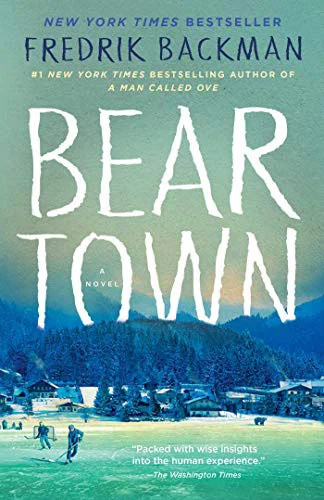“Beartown” by Fredrik Backman
Beartown: A Novel
By Fredrik Backman
2017
432 pages. Audio: 13 hours and 11 minutes
Fiction
—
Fredrick Backman is a Swedish writer who became famous in the United States for his novel A Man Called Ove. For truth in advertising, I need to admit that I haven’t read that book. It actually had no appeal to me. It apparently is about a lovable curmudgeon, and I tend not to want to read books that track too closely with my own life. But I do want to evangelize for a later novel, Beartown, translated by Neil Smith and appearing in English in 2017.
We need to get this out of the way early: the book is about hockey. Except at its heart, it’s not exactly. In fact, the person who put me on to this book is no hockey fan and not much of a sports fan at all.
It is actually about many things and it is a good old-fashioned plot-driven, character-rich novel. This is one of those where you are going to be driven compulsively to read to the end to find out what happens. And there are going to be characters who you are really going to root for.
One of the themes of the book is our obsession with sports. What happens when the whole town and everyone in the town depends—for their identity and perhaps their livelihoods—on how the youth hockey team does? Like that could ever happen.
It is also about family—the ties that bind us and the things that might push us apart. It is about the indelible impact of family tragedy as the family tries to move forward.
It is about ethics and character and loyalty and how conflicting responsibilities get worked out.
I know all of that is a bit vague, but the novel is so beautifully constructed in rolling out new revelations that help us understand why each character is acting as they do, I’m loath to give away much of the plot.
But even the jacket of the book gives away this much: the star of the hockey team carrying the hopes of a whole town is accused of sexual assault. This is a small town. Everyone’s life is entangled with that of every other person in town. This is not a crisis of strangers but one involving friends and neighbors.
Most of the characters are complex and multidimensional in their motivations, though one character kind of flattens out in the latter half of the novel. The conclusion is not entirely neat, but it is satisfying. And of course it is not just about the destination but about the trip.
It is easy for novels to get stuck in neat categories. One could call this a #MeToo novel since it touches on the very contemporary and vexing problem of sexual assault. One could also call it a sports novel since the town’s obsession with its hockey team drives all of the action. But it defies easy categorization. Like all good novels, it is about many things and resists being forced into a narrow definition. Kind of like life itself.








